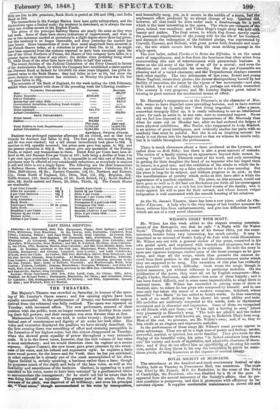THE THEATRES.
Her Majesty's Theatre was crowded on Saturday, in honour of the open- ing of Mr. Lumley's Opera season; and few opening nights have been equally successful. In the performance of Ernani, our favourable augury derived from the rehearsal was fully realized. The opera was repeated on Tuesday, with increased effect. The new performers, assured of their position with the public, were no longer restrained by timidity from exert- ing their full powers; and their reception was even warmer than at first.
Mademoiselle Cruvelli, we are told, is under twenty; though her intel- lectual cast of countenance and dignity of air make her look older. Her voice and execution displayed the qualities we have already described. On the first evening there was something of effort and straining perceptible in the formation of her highest notes; but this almost disappeared on Tuesday, when she showed great equality of power throughout a very extensive scale. It is in the lower tones, however, that the rich volume of her voice is most satisfactory; and we would therefore class its register as a mezzo soprano. Signor Cuzzani, the new tenor, gave great pleasure by the sweet- ness of his voice, and his refined and expressive style: he requires a little more vocal power, for the house and for Verdi, than he has yet exhibited; in other respects he is already one of the most accomplished of his class. Signor Belletti is, strictly speaking, a baritone rather than a bass; though he possesses much of the depth and body of the bass voice, as well as the flexibility and smoothness of the baritone. Gardoni, in appearing in a part Unsuited to his voice, seems to have been actuated by a goodnatured desire to accommodate the management; for he could not but be aware that he was doing himself an injustice. The greater part of his music, from the 'mien of its pitch, was deprived of all brilliancy; and even his principal air, " Viii meco," though accommodated to his voice by transposition, and beautifully sung, yet, as it occurs in the middle of a scene, had the unpleasant effect produced by an abrupt change of key, Gardoni did, however, all that could be done under such a disadvantage for a part which is the least interesting in the opera. The whole per ormaoce of the piece, indeed, was excellent; and Victor Hugo's tragic story was told with beauty and pathos. The final scene, in which Rug Gomez sternly repels the passionate supplications of the young wife for the life of her husband, and demands the redemption of the forfeited pledge, was represented by Cruvelli, Cuzzani, and Belletti, with great power both dramatic and musi- cal; the trio which occurs here being the most striking passage in the whole opera.
The new ballet, called Fiorita et la Reine des Elfrides, is on the usual scale of magnificence; and is free from the heaviness that often arises from overcrowding this sort of entertainment with pantomimic business. It turns on the old story of the love of an elf for a mortal; and even the situations are not remarkable for novelty. But the pas d'ensemble are pleasing and of a varied character, and the Terpsichorean displays succeed each other rapidly. The two debutantes of last year, Rosati and young Marie Taglioni, retain their glories; the former distinguishing herself by her facility of execution, the latter by the vigour of her movements—and also, be it added, by a sort of oddity, which is perhaps not wholly unstudied. The scenery is very gorgeous, and Mr. Lumley displays great talent in turning to good account the mechanical means of effect.


























 Previous page
Previous page